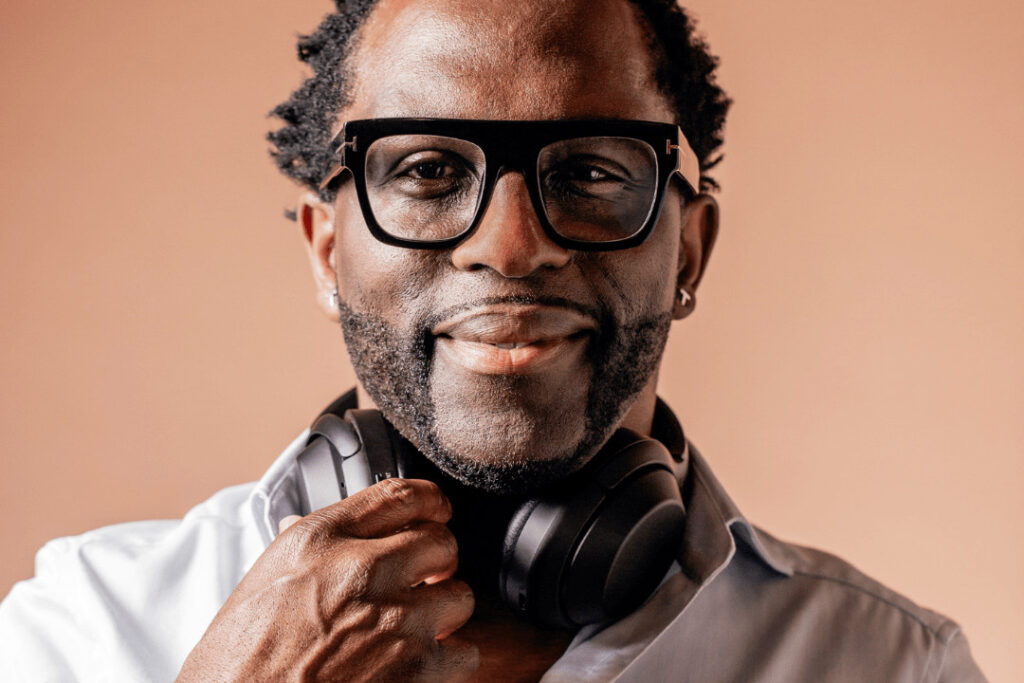Content warning: this story contains references to suicide.

“I’m a massive advocate for health and well-being and I would say that looking out for your hearing now is an investment for your future health.”
Musician, Tre Lowe is known for reaching the final in The Apprentice. What many viewers of the hit show don’t realise is that he also has tinnitus – a condition which causes persistent ringing or noise in the ears. Tre is a passionate supporter of RNID and often has spoken on TV on behalf of the charity to raise awareness of the condition.
How it began
Tre developed tinnitus at the tender age of 15, triggered by a traumatic experience following an appendix operation and worsened by his exposure to loud music in his career. Tre describes his tinnitus as so loud, he “could hear it if I was standing on the edge of the M25. It’s that loud, the sounds are like drawing your nails down a chalkboard. It is now a very intense version of tinnitus, because it’s multi frequency, when it used to just be one,” he says.
Early struggles and the importance of protecting your hearing
As a teenager, Tre faced immense challenges with tinnitus. “The stress I went through was massive at that time,” Tre recalls, indicating the profound impact this condition had on his young life. The onset of tinnitus marked the beginning of a difficult journey, one fraught with mental and emotional hurdles.
“In those early days I never related my tinnitus to loud music or anything like that. So obviously being in the band, being a musician, I was a massive noise addict, I’d have my headphones at maximum volume, my speakers, maximum volume. If I was in nightclub I’d be standing by the speakers, I was just a crazy noise addict.
“All that time I was making it worse and worse and worse, and I didn’t know. There is a real lack of education out there about protecting your hearing and how it’s so easy to damage your ears. I wish I’d known that and that’s why I’m so passionate about getting the message out there.
“Everyone knows about the importance of looking after their eyes. You only get one set of them. The same applies to your ears. We should be looking after them in the same way. I’m a massive advocate for health and well-being and I would say that looking out for your hearing now is an investment for your future health.”
Escalating challenges

Over time, Tre’s tinnitus got worse, and he struggled to cope with the overbearing sound in his ears: “I remember the frequencies became two, then three, then four, and then I lost count. Then my tinnitus had all sorts of nasty stuff, like low rumbling sounds, which was quite challenging at the time. I kind of got to the point where it felt unliveable. And I had to really train myself, because I knew it was me creating the turmoil by focusing too much on it and giving it too much attention.”
Personal growth and advocacy
Despite his tinnitus challenges, Tre has transformed his struggle into a source of strength. “The one good thing about what I’ve been through is that I developed a real love of self development, and it’s the self development that has made me so powerful,” he says. This has not only helped him manage his tinnitus but has also empowered him to help others.
Tre has taken his advocacy to public platforms, motivated by a desire to prevent others from suffering in silence. “There are people who potentially want to end their lives because of tinnitus. The only way I can reconcile what I’ve been through in life and what’s happened to me, is so I can serve others,” he says.
Coping mechanisms and mental resilience
Tre’s journey involved significant mental and emotional adjustments. He educated himself on the physiological and psychological aspects of tinnitus, realising that stress made his tinnitus worse. He developed a unique coping mechanism by personifying his amygdala (the part of the brain that is responsible for regulating emotions, such as fear and aggression), naming it ‘Amy.’
“I just taught myself how to deal with it to the point I will talk to Amy. This ringing that gets worse or sometimes I go deaf in one ear. I’ll be like, ‘Amy. I’ve got it. It’s fine.'” He learned to reduce the severity of his reactions, stating, “I’d dial her back from a 10 out of 10, back down to about a two, and my tinnitus became less overbearing.”
Acceptance and moving forward
Tre’s journey with tinnitus has been one of acceptance and resilience. He emphasises the importance of not allowing tinnitus to define a person’s identity. “It would be nice if everyone just shared what they are dealing with because it then gives hopes to others. There are other people who have tinnitus, and they think their life is over. They might think they’re alone, but everyone’s dealing with something, is what I’ve learnt. I’ve never met anyone that’s not dealing with something, and I believe we can work through our challenges in life no matter what they are.”
If you need to talk to someone call the Samaritans on 116 123 or email [email protected], anytime, any day.
If you are looking for support with tinnitus, contact RNID’s helpline.